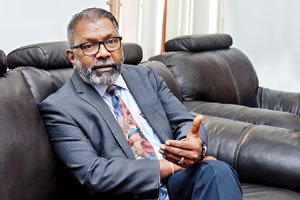News
Anti-ragging laws coming; new education system to promote personality building
View(s):By Yoshitha Perera
The amendments for the Anti-Ragging Act of 1978 will be made by end of March, next year, Higher Education State Minister Suren Raghavan said.
He said the amendments would not only be aimed at ragging, but there would also be regulations to change the structure of the state university system.
“Ragging is only a symptom of major structural issues in our university system. We have to understand that university problems are not only affect the institution, but also general education,” Dr. Raghavan said.

Suren Raghavan
He said 50% of university students were entering for arts subjects and it was because in more than 10,000 schools, 80% did not have sufficient English, science and maths teachers. He said students had no option but to select arts subjects.
“The job market has little or no room for arts subjects. Therefore we have to change the university intake and we also have to change the system of existing general education,” he said.
As general education reform, the Government was planning to ask students in Grade 10 whether they wished to study in an applied stream or in an academic stream. General education is where thirteen years of education was given to younger students and that was where personality building and positive attitudes towards others were cultivated, he said.
“When students come to university, the university system cannot then break them. As Higher Education State Minister, I want to say stop this politicisation of higher education by increasing the intakes in a practical manner,” Dr. Raghavan added.
He said politicians had come up and said that numbers had increased. However that had affected the quality of the university system, and was a heavy burden on the staff. Therefore state universities must come together and find out what their actual capacity for the next five years was and what could be delivered.
“Once we agree with that we then decide what number of quality undergraduates we can handle,” he said.
Students who passed the Advance Level exams must be given an opportunity either to study in a semi-government institutions or the government must give them loans and they can decide which university to go to, he added.
Certificate issuing would only make our system collapse. Ragging or violent behaviour between students and staff was all part of the systemic malfunctioning.
He said the Government was also planning to introduce the National Academic Quality Assurance Bill, which would govern as an independent commission such as the human rights commission. This commission would focus on quality and the administration would not be able to influence it.
Explaining the amendments to the Act, Dr. Raghavan said the Government was also focusing on internalising state universities by recruiting particularly diasporic academic staff who were willing to come and teach in Sri Lanka.
“We are also trying to bring international universities and South Asian campuses, to the local university system. We are having discussions with five international universities in North America, Europe and South Pacific area to collaborate with them,” he said.
The Indian Institute of Technology (IIT) in Chennai had signed agreements with Sri Lanka to bring in IIT in Bombay and the government was also having talks with three technical universities in Germany, Japan and Australia, Dr. Raghavan said.
The best way to say that you found the home of your dreams is by finding it on Hitad.lk. We have listings for apartments for sale or rent in Sri Lanka, no matter what locale you're looking for! Whether you live in Colombo, Galle, Kandy, Matara, Jaffna and more - we've got them all!

